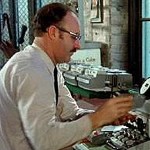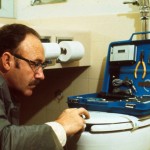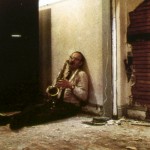Made between Godfather parts 1 and 2, The Conversation is atypical in many ways of its director, star and the brash style of American cinema of the 70s. Francis Ford Coppola chose to make a slow burning, haunting, elegiac psychological thriller with plot nods to Antonioni’s masterful Blow Up, and stylistically to film noir.
Gene Hackman was never better in his life than portraying surveillance expert Harry Caul, a man obsessed with his own privacy and tortured by self-doubt. Hackman’s character study of Caul has a smouldering intensity of the type you see so rarely in movies nowadays. You see plenty of people acting intense, but Hackman inhabits Caul, resplendent in his grey mac, moustache and nerdy horn-rimmed glasses, so completely his credibility is absolute – at no point do you think this is Gene Hackman, but the living, breathing Harry Caul, a man of few words but whose paranoid guilt-ridden demeanour, fuelled by Catholicism and a troubled upbringing, tells us much. I’m not a huge fan of The Method, but here it scorches the mind with its depth of feeling. Hackman barely faces the camera, such is the privacy with which Caul operates.
Everything we learn about Caul adds shades and nuances to our perspective of a loner – the fortress-like security on his apartment. When the concierge leaves a bottle of wine for Caul’s birthday, Caul is much more concerned that his space has been invaded and wants assurances that he has the only key. Caul has no friends, his mistress (prostitute?), Amy, in her lonely apartment is his only form of intimacy. “I don’t have any secrets,” he tells Amy when she asks him to tell her more about himself. “I’m your secret,” she replies.
His only true revelations come in a dream sequence in which he sees the girl he has been recording and tells her about his life story, but she does not appear to hear him. Nobody takes an interest in Harry or his past, only his expertise in eavesdropping.
Harry is utterly insecure about his own privacy because his life consists of exposing other people’s secrets – he has no other life. He plays tenor sax along to jazz classics, but remains preoccupied with his work. Caul is renowned within the surveillance industry as a master of his craft. Every manufacturer of bugging gear wants to offer him their kit and to be pictured with Caul, though the man himself, introverted to the point of isolation, prefers to accept commissions and do his job. His employees are just that, no more. He tolerates them because he can’t work entirely alone, but focuses on providing the best job possible. “I don’t care what they’re talking about,” he growls at Stan, a bored employee, “All I want is a nice fat recording.”
One such client job stirs Caul’s conscience, the bad memories relating to a client where his work resulted in a vicious murder. He and his team record for a client a conversation out in the open air using a variety of microphones posted at various locations around a square. Caul, an obsessive personality at the best of times, is driven to switch between the recordings to pick up all the words. He would normally hand the tapes over to his client, but here the words convince him this is a murder plot and the people concerned are in mortal danger.
This is Harry’s big mistake: taking a personal interest in this case in spite of being repeatedly warned off, results in his hearing a murder, though not the murder he expected. It demonstrates above all that leaping to conclusions can have fatal consequences for all concerned – particularly when your knowledge is restricted to the one conversation, taken out of context. There is a moment of genuine shock when the truth is revealed and Harry suddenly realises he has been an unwitting player in a bigger game, one well beyond his realm.
Hackman is supported beautifully by a brilliant cast including the late lamented John Cazale, Frederic Forrest, Cindy Williams, Robert Duvall, and even a youngish Harrison Ford. Look out especially for the Allen Garfield as the oily self-publicising rival bugger William P Moran who listens into a private conversation between Caul and Elizabeth MacRae as Meredith, who sleeps with Caul but then double-crosses him by stealing the tapes for Ford’s assistant to “the director”.
As with the Godfather movies, Coppola creates an ensemble feel, even though Hackman is the focal point from beginning to end, dominating the screen without ever acting ‘big’. Here, the directing and acting are deliberately and poetically austere and downbeat, and all the better for it. The movie pulls you into Caul’s paranoid world, without ever manipulating your emotions. You, the viewer, like Caul, are shocked by events but Caul is one hero for whom sympathy is not possible.
A word too for the equally haunting soundtrack, scored by David Shire (Coppola’s then brother-in-law.) The starkly beautiful piano of the main theme fits the mood of the piece to perfection. For my money it is the most incredibly wonderful piece of music in its own right, but never was a theme more fitted two its subject. An inspired marriage – the music captures the mood of the piece to perfection. From Wikipedia:
The Conversation featured an austere score for piano. On some cues, Shire took the taped sounds of the piano and distorted them in different ways to create alternative sonic textures to round out the score. The music is intended to capture the isolation and paranoia of protagonist Harry Caul (Gene Hackman).
Coppola struck a chord in 1974. This was the era of Watergate, the White House tapes and public scandal. Surveillance was high on the agenda, but the layers of fascination with the process of interpreting the conversation meld beautifully with the complexities of the Caul character to make a movie you will not easily forget, right the way through to the stunning twist in the tale. This is a film of slow-moving subtlety and cunning. It doesn’t need huge action sequences to be totally beguiling. Unquestionably one of my top 20 movies of all time, and a great achievement for all concerned. I urge you to watch it!
PS. From Wikipedia, here is the plot summary, but beware – SPOILER ALERT:
Harry Caul (Gene Hackman) is a surveillance expert who runs his own company in San Francisco. Highly respected within the profession, Caul is obsessed with his own privacy; his apartment is almost bare behind its triple-locked door and burglar alarm, he uses pay phones to make calls, claims to have no home telephone and his office is enclosed in wire mesh in a corner of a much larger warehouse. Caul is utterly professional at work, but finds personal contact extremely difficult; dense crowds make him uncomfortable, and he is withdrawn and taciturn in more intimate social situations. His appearance is nondescript, except for his habit of wearing a translucent grey plastic raincoat almost everywhere he goes, even when it is not raining.
Caul insists that he is not responsible for the actual content of the conversations he records or for the use to which his clients put his surveillance activities. Nevertheless, he feels wracked by guilt over a past wiretap job which resulted in the murder of three people; this sense of guilt is amplified by his devout Catholicism. His one hobby is playing along to jazz records on a tenor saxophone in the privacy of his apartment.
Caul, his colleague Stan (John Cazale) and some freelance associates have taken on the task of bugging the conversation of a couple (Cindy Williams and Frederic Forrest) as they walk through crowded Union Square inSan Francisco, surrounded by a cacophony of background noise. Amid the small-talk, the couple discuss fears that they are being watched, and mention a discreet meeting at a hotel room in a few days. The challenging task of recording this conversation is accomplished by multiple surveillance operatives located in different positions around the square. After Caul has worked his magic on merging and filtering different tapes, he produces a sound recording in which the words themselves become crystal clear, but their actual meaning remains ambiguous.
Although Caul cannot understand the true meaning of the conversation, he finds the cryptic nuances and emotional undercurrents contained within it deeply troubling. Sensing danger, Caul feels increasingly uneasy about what may happen to the couple once the client hears the tape. He plays the tape again and again throughout the movie, gradually refining its accuracy. He concentrates on one key phrase hidden under the sound of a street musician: “He’d kill us if he got the chance”. Caul constantly reinterprets the speakers’ subtle emphasis on particular words in this phrase, trying to figure out their meaning in the light of what he suspects and subsequently discovers.
Caul avoids handing in the tape to Martin Stett (Harrison Ford), who works for The Director (Robert Duvall), the man who commissioned the surveillance. Afterwards, he finds himself under increasing pressure from the client’s aide and is himself followed, tricked, and bugged. The tape of the conversation is eventually stolen from him in a moment when his guard is down.
Tormented by guilt over what he fears will happen to the couple, Caul’s desperate efforts to forestall disaster ultimately fail. He rents a hotel room adjoining the one where the couple said they planned to meet, and uses a listening device to monitor it. He overhears a heated argument between the woman and The Director, and to his horror, the tape being played back at a particularly incriminating moment. He runs to the balcony outside, hears the woman screaming, and witnesses a bloody hand frantically slamming against the frosted glass partition. Overcome with remorse, he retreats to his room and collapses into an uneasy slumber. Several hours later, Caul awakens, picks the lock into the adjoining room, and initially sees nothing amiss. On closer investigation, he flushes the clogged toilet and waves of blood come flowing out. He flees the scene, unsuccessfully tries to confront The Director at his office, and is stunned to see the couple unharmed. To Caul’s surprise, the conversation he had obsessed over might not mean what he thought it did: the terrible event he dreaded differs from the one that actually happened. Caul sees a newspaper headline about The Director’s death in a “car accident”, but Caul knows that the couple killed him in the hotel room. He now realizes that the statement “He’d kill us if he got the chance” was a rationalization of the couple’s decision to kill The Director.
While later practicing saxophone in his apartment, Caul receives a call from Stett on his unlisted telephone in which Stett warns: “We know that you know, Mr. Caul. For your own sake, don’t get involved any further. We’ll be listening to you.” At the end of the call, Stett plays back a recording of Caul’s saxophone practice, which sets him off on a frantic search for the listening device. He tears up walls and floorboards, ultimately destroying his apartment in the process, but to no avail. The film’s end leaves him sitting amidst the wreckage, playing one of the only things in his apartment left intact: his saxophone.





